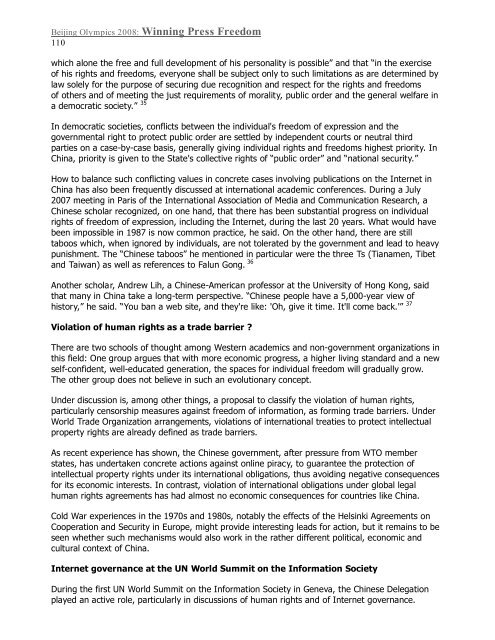Beijing Olympics 2008: Winning Press Freedom - World Press ...
Beijing Olympics 2008: Winning Press Freedom - World Press ...
Beijing Olympics 2008: Winning Press Freedom - World Press ...
Create successful ePaper yourself
Turn your PDF publications into a flip-book with our unique Google optimized e-Paper software.
<strong>Beijing</strong> <strong>Olympics</strong> <strong>2008</strong>: <strong>Winning</strong> <strong>Press</strong> <strong>Freedom</strong><br />
110<br />
which alone the free and full development of his personality is possible” and that “in the exercise<br />
of his rights and freedoms, everyone shall be subject only to such limitations as are determined by<br />
law solely for the purpose of securing due recognition and respect for the rights and freedoms<br />
of others and of meeting the just requirements of morality, public order and the general welfare in<br />
a democratic society.” 35<br />
In democratic societies, conflicts between the individual's freedom of expression and the<br />
governmental right to protect public order are settled by independent courts or neutral third<br />
parties on a case-by-case basis, generally giving individual rights and freedoms highest priority. In<br />
China, priority is given to the State's collective rights of “public order” and “national security.”<br />
How to balance such conflicting values in concrete cases involving publications on the Internet in<br />
China has also been frequently discussed at international academic conferences. During a July<br />
2007 meeting in Paris of the International Association of Media and Communication Research, a<br />
Chinese scholar recognized, on one hand, that there has been substantial progress on individual<br />
rights of freedom of expression, including the Internet, during the last 20 years. What would have<br />
been impossible in 1987 is now common practice, he said. On the other hand, there are still<br />
taboos which, when ignored by individuals, are not tolerated by the government and lead to heavy<br />
punishment. The “Chinese taboos” he mentioned in particular were the three Ts (Tianamen, Tibet<br />
and Taiwan) as well as references to Falun Gong. 36<br />
Another scholar, Andrew Lih, a Chinese-American professor at the University of Hong Kong, said<br />
that many in China take a long-term perspective. “Chinese people have a 5,000-year view of<br />
history,” he said. “You ban a web site, and they're like: 'Oh, give it time. It'll come back.'” 37<br />
Violation of human rights as a trade barrier ?<br />
There are two schools of thought among Western academics and non-government organizations in<br />
this field: One group argues that with more economic progress, a higher living standard and a new<br />
self-confident, well-educated generation, the spaces for individual freedom will gradually grow.<br />
The other group does not believe in such an evolutionary concept.<br />
Under discussion is, among other things, a proposal to classify the violation of human rights,<br />
particularly censorship measures against freedom of information, as forming trade barriers. Under<br />
<strong>World</strong> Trade Organization arrangements, violations of international treaties to protect intellectual<br />
property rights are already defined as trade barriers.<br />
As recent experience has shown, the Chinese government, after pressure from WTO member<br />
states, has undertaken concrete actions against online piracy, to guarantee the protection of<br />
intellectual property rights under its international obligations, thus avoiding negative consequences<br />
for its economic interests. In contrast, violation of international obligations under global legal<br />
human rights agreements has had almost no economic consequences for countries like China.<br />
Cold War experiences in the 1970s and 1980s, notably the effects of the Helsinki Agreements on<br />
Cooperation and Security in Europe, might provide interesting leads for action, but it remains to be<br />
seen whether such mechanisms would also work in the rather different political, economic and<br />
cultural context of China.<br />
Internet governance at the UN <strong>World</strong> Summit on the Information Society<br />
During the first UN <strong>World</strong> Summit on the Information Society in Geneva, the Chinese Delegation<br />
played an active role, particularly in discussions of human rights and of Internet governance.





